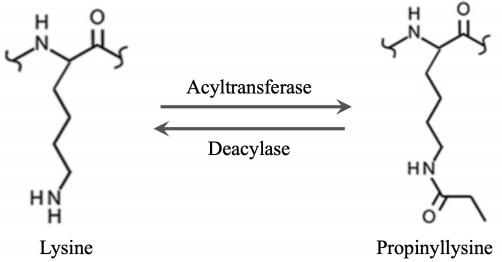Quantitative Propionylation Service
- Metabolic Regulation: Investigating the role of propionylation in regulating metabolic pathways such as fatty acid metabolism and glycolysis.
- Cancer Biology: Exploring the impact of propionylation on cancer cell proliferation, apoptosis, and invasion.
- Neuroscience: Studying the potential role of propionylation in neurodegenerative diseases, including Alzheimer's disease.
- Epigenetic Regulation: Analyzing how propionylation affects histone function and its implications for gene expression regulation.
- Drug Development: Identifying potential drug targets and biomarkers through quantitative analysis of propionylation, contributing to novel therapeutic strategies.
Protein propionylation is an important post-translational modification (PTM), where a propionyl group is covalently attached to the lysine residue of a protein, typically catalyzed by acyltransferases such as acetyltransferases. The propionyl donor is often a molecule like propionyl-CoA. Lysine propionylation is a reversible modification observed in both eukaryotes and prokaryotes, playing a critical regulatory role in numerous biological processes. As a relatively recent discovery, the full range of propionylation's biological functions remains under investigation, particularly regarding its roles in metabolic regulation, cellular stress responses, and epigenetic control.

Figure 1. Protein Propionylation and Depropionylation Process
Research to date indicates that propionylation influences metabolic networks in bacteria, regulates the activity of metabolic enzymes, and is involved in the cellular stress responses of both bacteria and mammalian cells. Moreover, propionylation plays a significant role in photosynthesis regulation and epigenetic modifications in both prokaryotes and eukaryotes. Thus, quantitative analysis of protein propionylation is essential for understanding its functions and the molecular mechanisms underlying these processes.
MtoZ Biolabs offers a comprehensive Quantitative Propionylation Service, utilizing cutting-edge mass spectrometry (LC-MS/MS) technology. This service provides end-to-end solutions for researchers, from sample preparation to data analysis, allowing in-depth study of propionylation's role in various biological systems.
Analysis Workflow
The Quantitative Propionylation Proteomics service at MtoZ Biolabs leverages high-resolution mass spectrometry (LC-MS/MS) along with advanced antibody enrichment strategies to accurately identify and quantify lysine propionylation sites on proteins. Our service covers all aspects of the workflow, including sample preparation, enrichment of propionylated peptides, mass spectrometric analysis, and detailed data interpretation, enabling researchers to systematically explore how propionylation affects biological processes.

Service Advantages
1. High Sensitivity
Our advanced mass spectrometry and enrichment techniques enable the accurate detection of even low-abundance propionylation sites.
2. Comprehensive Coverage
Using both TMT/iTRAQ labeling and Label-Free techniques for sample analysis significantly enhances experimental efficiency while ensuring high-quality data.
3. Quantitative Accuracy
Our cutting-edge quantification methods ensure precise and reliable data, even under varying experimental conditions.
4. Extensive Bioinformatics Support
We offer comprehensive bioinformatics analysis to help researchers explore the roles of propionylation in metabolic regulation, epigenetic mechanisms, and other processes.
5. One-Time-Charge
Our pricing is transparent, no hidden fees or additional costs.
Sample Submission Requirements

For more sample details, please consult our technical team.
Applications
Protein propionylation is involved in various biological processes, and quantitative analysis of this modification provides valuable insights for multiple research areas, including but not limited to:
MtoZ Biolabs' Quantitative Propionylation Service provides researchers with precise, efficient support for studying this emerging protein modification. Through our state-of-the-art mass spectrometry platform and expert technical team, we offer comprehensive solutions that facilitate scientific discovery and innovation.
How to order?







